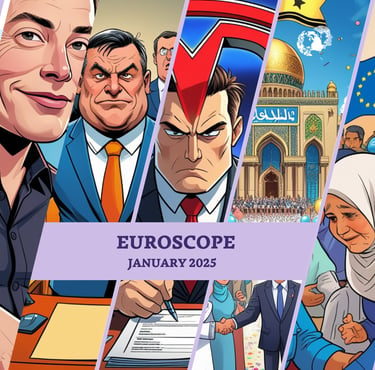Euroscope / January 2025



1/ Musk's interview of AfD's party chief Alice Weidel
In the run-up to the German federal election scheduled for February 23, 2025, Elon Musk livestreamed a 74-minute conversation with Alice Weidel, candidate for chancellor and co-chair of the far-right Alternative for Germany (AfD) party, on his platform X (formerly Twitter) on January 10, 2025. The problem with the AfD, which is known for its tough stance on immigration and Islam, is that the party is under surveillance by Germany's domestic intelligence agency because it is accused of using Nazi slogans in its speeches and downplaying the Holocaust, which the party denies. Musk's involvement with Weidel and his support for the AfD has therefore sparked controversy, as he has been accused of meddling in German politics and reinforcing far-right viewpoints. Elon Musk even said: “People really need to get behind the AfD. Otherwise, things are going to get a lot worse in Germany.” As a result, the European Commission is monitoring X for compliance with the Digital Services Act, which aims to regulate online content and prevent the spread of misinformation.
2/ Hungary blocks EU statement condemning Belarus election
With 86.8% of the vote, Alexander Lukashenko was re-elected for a seventh five-year term as President of Belarus on January 26, 2025. However, his time in office has been marked by accusations of authoritarianism, suppression of the political opposition and electoral fraud. In the months leading up to the election, the government stepped up its crackdown on dissent and arrested over 100 people in November 2024. This prompted the EU to attempt to issue a joint statement condemning the election process, as the election was neither free and fair nor lawful. However, the joint statement was blocked by Hungary, raising concerns about the country's foreign policy stance at a time when the EU needs to adopt a unified foreign policy stance. Therefore, Kaja Kallas, the High Representative for Foreign Affairs, and the EU Commissioner for Enlargement, Marta Kos, issued their own statement calling the presidential elections in Belarus a sham and illegitimate.
3/ Tesla joins court challenges to EU tariffs on Chinese EVs
Tesla joined BMW and several Chinese electric vehicle manufacturers (e.g. BYD, Geely, SAIC) on January 27, 2025 in taking legal action against the tariffs on electric vehicles “Made in China” imposed by the European Commission in October 2024. The duties followed an anti-subsidy investigation which found that Chinese manufacturers benefited from significant government subsidies (i.e. they were able to sell cars at lower prices and thus undercut European competitors). Specifically, SAIC has a tariff rate of 35.3%, BYD 17%, Geely 18.8% and BMW 20.7%, while Tesla has a lower rate of 7.8%. Although BMW and Tesla are non-Chinese companies, they are subject to tariffs because they produce cars in China. Although Tesla also produces in Berlin, the Shanghai plant is an important production site from which a significant number of vehicles for the European market are supplied. Representatives of the car brands argue that the tariffs imposed are unfair, and consequently filed a complaint with the General Court of the Court of Justice of the European Union. They stand up for the principles of free trade and fear retaliatory measures in China that could disrupt the global automotive supply chain and the profits of these companies.
4/ Sanctions on Syria to be lifted
Following the collapse of Bashar al-Assad's regime in Syria on December 8, 2024, there have been calls for the sanctions imposed by the EU on the country since 2011 (e.g. travel bans, arms embargo, asset freezes, oil export restrictions) to be lifted. As the Union wants to support Syria's reconstruction, EU foreign ministers have agreed on a “roadmap” that provides for a gradual lifting of certain sanctions from January 27, 2025, in areas that are crucial for reconstruction, such as energy, transport and financial institutions. However, the EU remains cautious and stresses that the easing is reversible and depends on the new Syrian authorities, led by the Islamist group Hayat Tahrir al-Sham (HTS), given its history and classification as a terrorist organization.
5/ EU ministers agree to revive Rafah Border Mission
After 18 years of suspension, the EU announced the reactivation of the European Union Border Assistance Mission (EUBAM) in Rafah to monitor the border crossing between the Gaza Strip and Egypt. EUBAM was first established in 2005 following Israel's withdrawal from the Gaza Strip, but was then suspended in 2007 after Hamas took control of the Gaza Strip. Given the fragile ceasefire between Israel and Hamas, EUBAM comes at a critical time to support Palestinian border personnel and facilitate the transfer of people from Gaza, especially the injured and sick.




